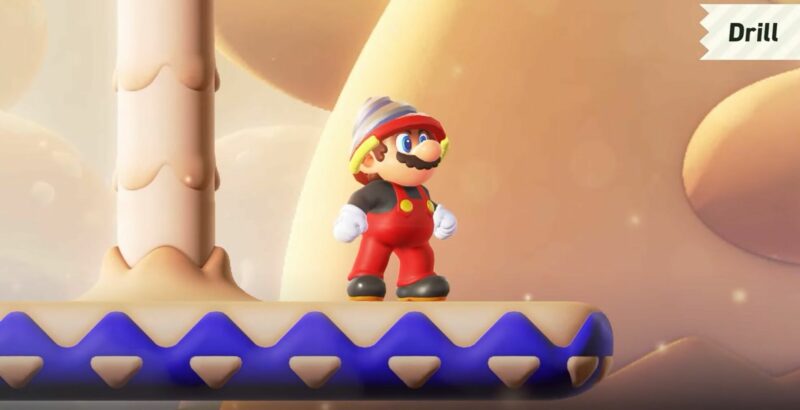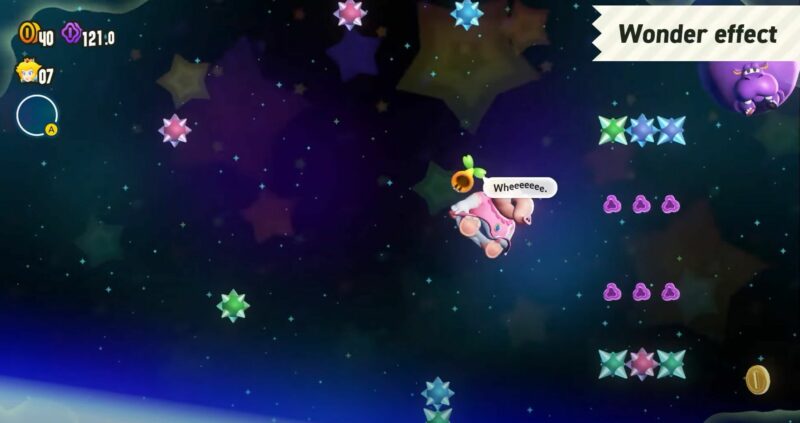
Talking flowers, Elephant Mario, hints of Bubble Bobble… the latest Nintendo Direct provided a fresh insight into Super Mario Bros Wonder’s gentle surrealism.
Super Mario Bros may be one of the jewels in Nintendo’s crown, but the company has a remarkably relaxed, playful approach when it comes to designing its various series entries. In Super Mario Bros Wonder, out in October, Nintendo’s designers are evidently doubling down on the streak of Lewis Carroll proto-surrealism that has run through the series since its beginnings in the early 1980s.
Take a quick look through the new footage shown off in yesterday’s Nintendo Direct, and you’ll find a side-scrolling platformer that remains true to the basic format that has existed from 1985’s Super Mario Bros onwards, but also throws in design ideas that range from the whimsical to the utterly bizarre. Among Mario’s new powers you’ll find the Elephant form that took the web by storm when it first emerged a few months ago, along with a drill ability that makes the Italian plumber look uncannily like a member of the 70s/80s new wave band, Devo (coincidence? We’d like to think not).

Another newly-unveiled ability appears to be directly inspired by Taito’s coin-op classic, Bubble Bobble. Collect the relevant power-up item, and Mario will have the ability to blow bubbles capable of encasing even the toughest of rank-and-file enemies and turning them into coins; said bubbles can even be jumped on as temporary platforms – again, just like Bubble Bobble.
The playful surrealism isn’t confined to power-ups, either. The pastel-shaded world of the Flower Kingdom is ruled over by a grinning caterpillar named Prince Florian, and its landscape is dotted with talking flowers that comment on everything they see. (Nintendo, perhaps realising that chatty flora could grate after a while, has seemingly provided the option to put these on mute.)
Then there’s the Wonder feature advertised in the game’s title. Collect a Wonder Flower, and it’ll have a psychedelic effect that varies from level to level – pipes come to life and start moving by themselves; entire stages tilt at awkward angles; perspectives can change from side-on to top-down; if we didn’t know better, we’d say Nintendo was making a deliberate allusion to the effects of LSD (or perhaps magic mushrooms).

All these outlandish ideas mark a welcome contrast to the more tried-and-true stuff seen elsewhere in the Direct footage. For all the wild abilities and trippy reality-warping, Super Mario Bros Wonder’s courses still follow the kinds of themes we’ve seen in platformers for almost 40 years now: elemental stages based on ice and fire; levels set among the clouds, in the desert, under the sea, underground, and so forth.
Still, it’s pleasing to see that Wonder’s creators – headed up by producer Takashi Tezuka and director Shiro Mouri – are still able (and willing) to push beyond the series’ framework and introduce ideas that are so wilfully odd. As Mouri noted in an interview with Eurogamer, mechanics and designs that were are now familiar to players were fresh and new in 1985. Things like Wonder Flowers, Devo-like drill hats, and more besides, are an attempt to re-introduce that sense of surprise and freshness to the series – and the result could be the most likeably weird entry since Super Mario Land and its hopping zombies and flying saucers. This, we’d argue, is far from a bad thing.
Super Mario Wonder is out on 20 October for Nintendo Switch.

Suggested product
SPECIAL BUNDLE! Film Stories issue 54 PLUS signed Alien On Stage Blu-ray pre-order!
£29.99







